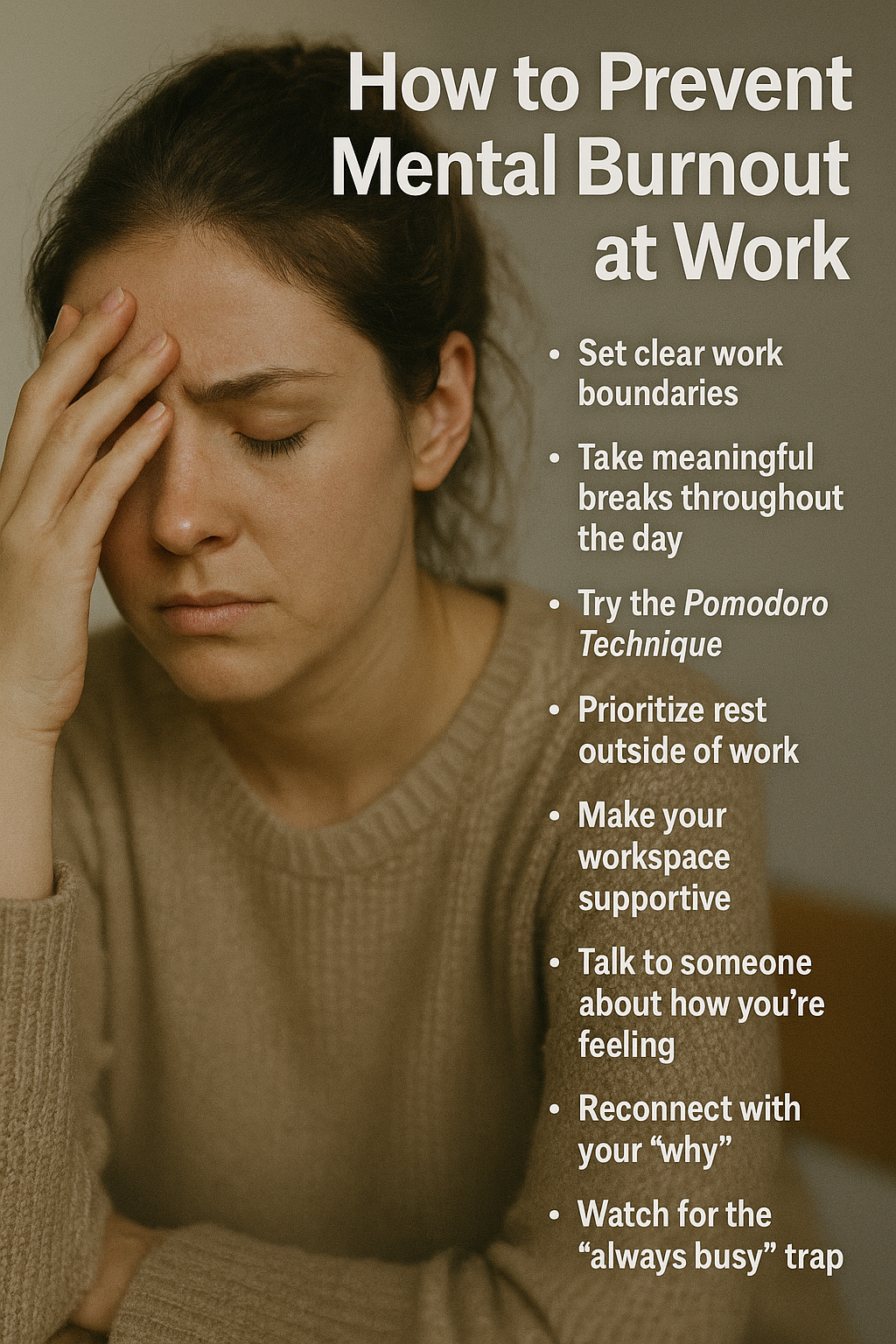Mental burnout is more than just feeling tired after a long day—it’s a state of emotional, physical, and mental exhaustion caused by prolonged and excessive stress. If you’ve ever felt like you’re running on empty, losing motivation, or detaching from your job, you might be experiencing burnout.
Burnout doesn’t happen overnight. It builds slowly, often going unnoticed until your productivity, mood, and well-being begin to suffer.
In this article, we’ll explore the warning signs of burnout, what causes it, and—most importantly—how you can prevent it with simple, actionable strategies.
What Is Mental Burnout?
Mental burnout is a condition characterized by:
- Chronic fatigue
- Cynicism or detachment from work
- Reduced performance and focus
- Emotional numbness or irritability
It’s especially common in high-stress environments and roles that involve constant emotional output, like caregiving, teaching, and high-pressure office jobs.
Burnout isn’t a weakness—it’s a signal that your mental resources are being depleted without adequate recovery.
Early Warning Signs to Watch For
The earlier you catch burnout, the easier it is to reverse. Here are signs to look out for:
- You feel exhausted all the time, no matter how much you sleep
- You dread going to work or starting your day
- You feel emotionally numb or disconnected from your tasks
- You’re easily irritated by small issues or people
- You feel unmotivated, even with things you used to enjoy
- You get frequent headaches, stomach problems, or sleep disturbances
If several of these sound familiar, it’s time to take a step back and reassess your mental health.
1. Set Clear Work Boundaries
Boundaries are one of the most powerful tools to prevent burnout. Without them, your work-life balance quickly dissolves.
How to set boundaries:
- Set a time when your workday ends—and stick to it.
- Avoid checking emails or messages after hours.
- Say “no” to tasks that overload your capacity.
- Communicate clearly about your limits with coworkers and clients.
Protecting your time is protecting your well-being.
2. Take Meaningful Breaks Throughout the Day
Skipping breaks may seem productive, but it leads to quicker exhaustion and lower-quality work.
Healthy break ideas:
- Step outside for fresh air
- Stretch or move your body
- Listen to music or a podcast
- Practice deep breathing or mindfulness
Even 5–10 minute pauses can refresh your brain and reset your energy.
3. Use the “Pomodoro Technique” to Avoid Overwhelm
This time management method breaks work into focused intervals (usually 25 minutes) followed by short breaks.
Here’s how it works:
- Choose a task
- Work for 25 minutes (set a timer)
- Take a 5-minute break
- Repeat 4 times, then take a longer break (15–30 minutes)
This prevents mental fatigue and makes big projects feel more manageable.
4. Prioritize Rest Outside of Work
Your off-hours are for recovery—not just more productivity. Filling every moment with errands, scrolling, or noise can leave you just as drained.
Try this:
- Build a relaxing evening routine
- Sleep 7–9 hours per night
- Dedicate time to hobbies or calm activities
- Reduce screen time before bed
Rest isn’t laziness—it’s how your brain restores balance.
5. Make Your Workspace Supportive
A cluttered, chaotic workspace contributes to mental overload.
How to improve your work environment:
- Keep your desk organized and minimal
- Use plants, natural light, or calming decor
- Eliminate visual distractions when focusing
- Use noise-canceling headphones or soft background music
Your environment should help you feel in control, not overwhelmed.
6. Talk to Someone About How You’re Feeling
Burnout often thrives in silence. Talking about your stress doesn’t make you weak—it’s a key step in managing it.
Who to talk to:
- A trusted friend or coworker
- A manager or HR professional
- A mental health counselor
Even a short conversation can help validate your feelings and clarify your next steps.
7. Reconnect With Your “Why”
Burnout can make your work feel meaningless. Revisiting your deeper purpose can reignite your motivation.
Reflect on questions like:
- What impact does my work have?
- What aspects of my job do I enjoy?
- What values led me to this career in the first place?
Purpose fuels resilience. Even small reminders can make a big difference.
8. Watch for the “Always Busy” Trap
Constant busyness is a cultural badge of honor—but it’s not sustainable. You don’t need to be productive every minute to be valuable.
Replace busy with intentional:
- Block time for focused work
- Schedule breaks like you would meetings
- Take mental health days when needed
- Let go of perfectionism in favor of progress
Busy isn’t always effective. Balanced is better.
9. Use Digital Tools to Support Your Mental Health
Technology can help if used intentionally.
Helpful tools:
- Calendar blocking apps (like Google Calendar or Sunsama)
- Focus apps (like Forest or Focus Booster)
- Mindfulness apps (like Headspace or Insight Timer)
- Journaling apps (like Day One or Reflectly)
Let tech support your rhythm instead of hijacking your attention.
Final Thoughts: Your Health Comes First
No job is worth sacrificing your mental health. Burnout is real, but it’s also preventable with the right strategies and self-awareness.
Start with one or two small changes:
- Protect your time
- Prioritize rest
- Speak up when you need help
The more you invest in your mental energy today, the more focused, creative, and fulfilled you’ll feel tomorrow.
You don’t have to wait for a crisis to start taking care of yourself. Start now. Your mind—and your future self—will thank you.

